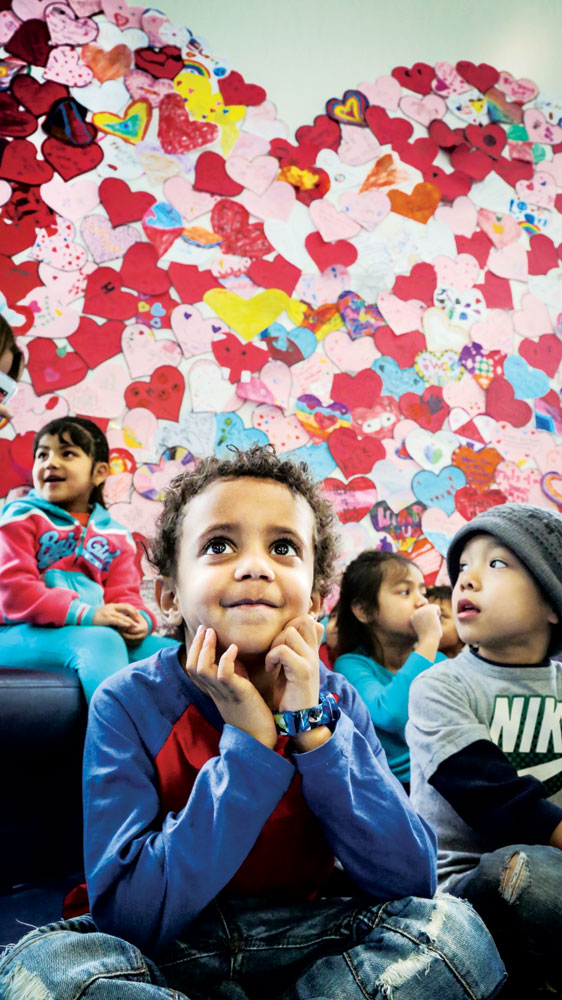
Yotam Ghebremeskel and other refugee students gather in front of a giant Valentine at Isabella Bird Community School after receiving gifts of books and art supplies.
The day before Valentine’s Day, Isabella Bird Community School celebrated its refugee community with a strong showing of love by giving away books and art supplies to refugee students. The event was coordinated by Suzanne Tonini, the school librarian, who wanted the newcomer students to know that “they are an important part of our community,” and for Izzi B’s mainstream students to understand “refugees are not associated with terrorism.”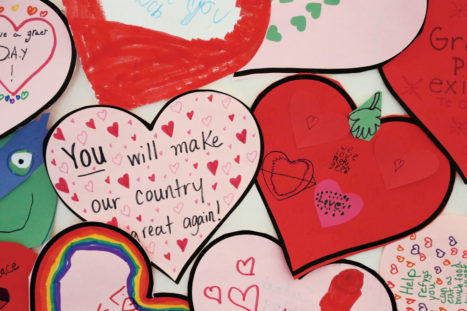
Contributions of over 1,000 homemade valentines, art supplies and gently used books poured in from area schools, including Bill Roberts, Swigert, Good Shepherd Catholic School and Denver Language School, as well as Girl Scout Troop 60580 and community members. For those who contributed, “It’s a jump-starter for a conversation about what it means to not have a safe place to live and what it means to come to a country like ours,” said Tonini. Nearly a dozen parent volunteers were on hand at the event to help the students select items.
Tonini also coordinated special lessons at the school, teaching students in grades K-5 about what it means to be a refugee. “Several classroom teachers are expanding on this lesson, using children’s literature … to extend the conversation and deepen children’s understanding of the refugee experience.” Last fall, fourth-grade teacher Angie Costello saw the need for books that show diversity; she applied for and won a $1,000 grant from the DPS Foundation A to Z Fund to purchase books with diverse characters for her classroom library.
The outpouring from the community was so great that each of the approximately 70 children participating was able to choose up to 10 books and 10 types of art supplies. Even so, there were extra books, and Tonini is setting up a free library where both refugee and non-refugee Izzi B students who lack large home libraries can select books throughout the year.
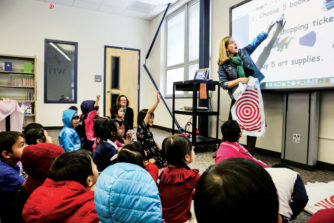
Librarian Suzanne Tonini, who coordinated the event, explains to refugee students how they will “shop” for books and art supplies.
The Newcomer Program
Izzi B is home to the Newcomer Center, a program that enrolls refugee children who hail from a wide array of countries including Burma, Nepal, Somalia, Eritrea, Sudan, Iraq, Bangladesh, Tanzania, Democratic Republic of Congo and Indonesia. The children are part of DPS’s English Language Acquisition (ELA) Program, which serves students with limited English language skills, and many of them have received little to no formal education even in their native tongues. The only other school in DPS to serve a significant refugee student population is Place Bridge Academy, in south Denver. The program was deliberately established by the original administrative leaders at Izzi B.
Currently, there are three dedicated classrooms for the Newcomer students: ECE, K and a blended 1/2. Each of these is staffed with a teacher and paraprofessional through the DPS ECE or DPS ELA departments. After about a year, these students join traditional classrooms. In the upper grades, where there are fewer newcomers, refugee students are integrated into mainstream classrooms and
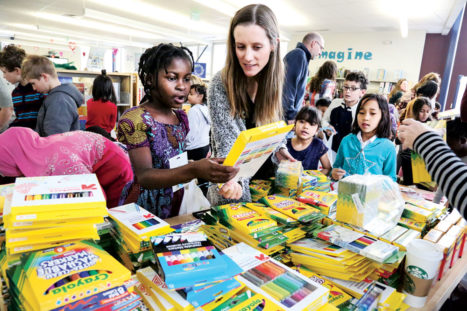
ESL Teacher Sophie Glover, along with many parent volunteers from the mainstream side of the school, were on hand at the event to help students like Busime Matabishi choose books and art supplies.
receive in-class support.
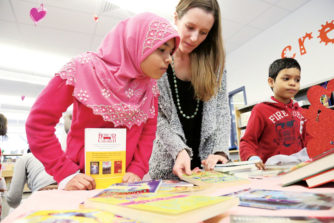
Amisa Shamshu Alamc chooses among books with assistance from ESL teacher Sophie Glover. Behind them, Haysham Shamshu Alam appears to be contemplating his selections.
Students took their time, carefully choosing books that suited their reading levels and interests. Many of them already understand English after only a few months in school.
Refugee students at all grade levels join their peers for non-academic classes, such as P.E., art, music and library, as part of the focus on inclusion and integration at Izzi B. In addition, mainstream students serve as volunteer “ambassadors,” paired up 1:1 with refugee students and acting as “buddies and positive role models,” said Kim Hundley, dean of culture, playing with them, eating lunch with them, and introducing them to American culture.
Hundley, who oversees the Newcomer Program and English language instruction, helps marshal an array of services to serve the students both at the school and in the wider community. “A huge part of our philosophy is that social-emotional part … it is emblematic of who we are,” says Hundley.
To connect with students and their families, Izzi B uses eight “community navigators,” who collectively speak 90 languages, and a family liaison. A full-time school psychologist/social worker helps with students’ social-emotional needs, and Izzi B’s on-site family service center further supports the Newcomers with food, counseling and access to safety net resources. Monthly meetings and parent-teacher conferences for Newcomer students are held at an apartment complex in NE Denver to accommodate the nearby families, who often lack the resources to get to the school for meetings.
Hundley also works with outside agencies, like Lutheran Family Services and Jewish Family Service, on placement and therapy. Hundley notes that so many students have experienced significant trauma. “They don’t really tell stories, but you can see it in their behavior, and in their art,” so she is working to enhance therapeutic opportunities for these children, including art and play therapy.
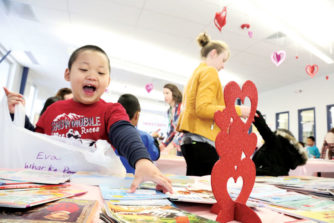
Wharka Por Aung excitedly picks up a book he likes. For some of the children it may be the first-ever books or art supplies of their own.
The children were joyful on Refugee Love Day, however, with most of them squealing and chatting as they filled their bags with books and art supplies. As part of its focus on supporting their
newcomers, Izzi B hosts similar events on a regular basis. The school has previously collected donated costumes for Halloween for their refugee students and pajamas for ECE and K refugee students—which come in handy when they earn “pajama days” in their classrooms. “The reason that drew me here is the chance to work with this population of kids … they are such lovely and loving people,” said Hundley.




0 Comments